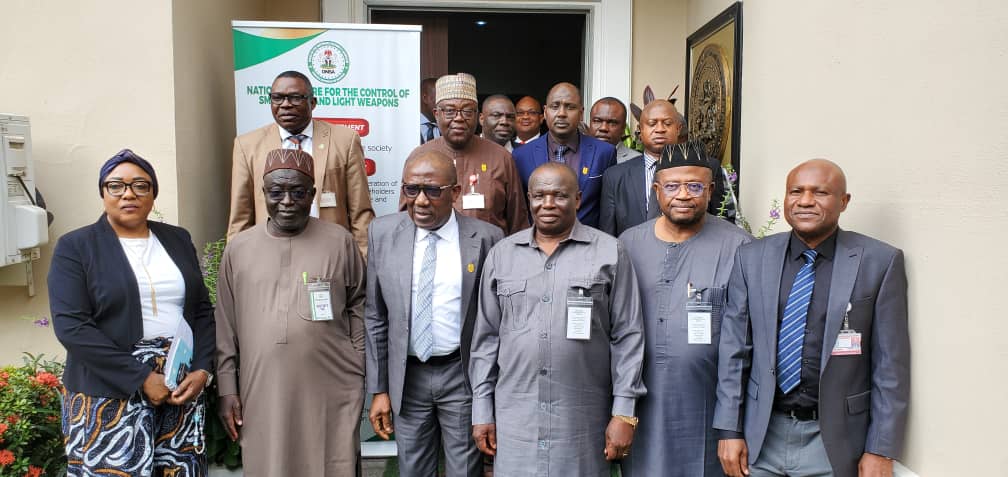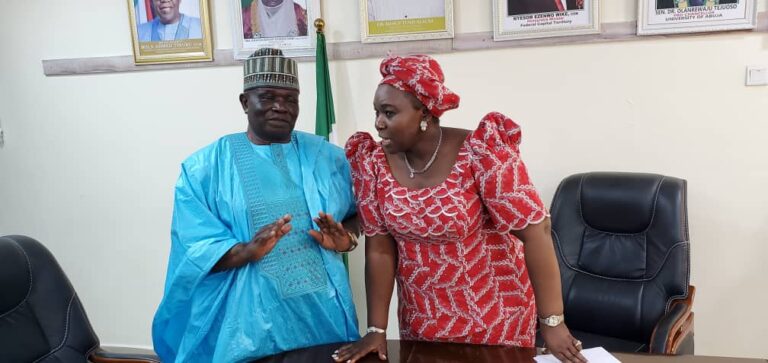In a strategic move to enhance Nigeria’s internal security architecture, the APUDI Institute for Peace Studies and Social Rehabilitation (APIS), in collaboration with the African Peace Institute for Social Research (APISR), the Institute of Governance and Development Studies (IGDS), Nasarawa State University, Keffi (NSUK), and the Directorate of Advancement and Research, Yakubu Gowon University (University of Abuja), has formally presented a concept note on the Integrated Community Security Initiative (ICSI Project) to the National Centre for the Control of Small Arms and Light Weapons (NCCSALW) Office of the National Security Adviser (ONSA).
The high-level engagement took place at the NCCSALW Headquarters in Abuja, where the team interfaced with the Director-General, Deputy Inspector General of Police (Rtd.) Johnson Babatunde Kokumo, alongside other Directors and senior staff of the Center.
Nigeria continues to grapple with multifaceted internal security threats, including terrorism, banditry, kidnapping, communal clashes, farmer-herder conflicts, and urban criminality. These growing challenges threaten national cohesion, economic stability, and democratic governance. While efforts by formal security agencies persist, there is a widening trust gap between security actors and local communities.
In their presentation the Team Lead of the ICSI Project , Prof. Danladi Abok Atu, emphasized the urgency of implementing community-rooted security initiatives to bridge the gap between state-led security actors and community-based approaches, which would enhance security agencies to carry out their primary responsibility of safeguarding the lives and properties of citizens, while simultaneously addressing the proliferation of Small Arms and Light Weapons (SALW) across non-state actors. Prof. Atu stated The ICSI project is a participatory initiative that empowers communities to identify and respond to their specific security needs, highlighting that the communities have a role to play due to the high weaponization of communities and the high proliferation of small and light weapons which are the drivers of high profile criminality such as, banditry, kidnapping Gun-running etc.
By collaborating with the NCCSALW, the ICSI project aims to integrate arms control into local security frameworks, ensuring community resilience against violence and conflict through the various components of the Project.
In his response, DIG (Rtd.) Johnson Babatunde Kokumo, commended the depth and professionalism of the team’s presentation, describing the initiative as timely and aligned with the NCCSALW’s mandate. He lauded the interdisciplinary approach, which places research and community participation at the center of national security enhancement.
The DG expressed the Center’s willingness to partner with the consortium and affirmed that the ICSI Project would be adopted, validated, and integrated into ongoing national security programs. He further revealed plans to initiate a pilot phase of the project and develop a policy framework to guide its national rollout.
He said the initiative represents the kind of innovative, research-led, and community-focused intervention we need to make real progress. The NCCSALW is ready to support and collaborate fully with this project.
The interface featured prominent scholars and security experts including:
Prof. Sulaiman Bala Mohammed, former Vice Chancellor, NSUK
Prof. Andrew E. Zamani, representing IGDS
Prof. Ladi Sule Matinja, Director of Advancement and Research, Yakubu Gowon University, Abuja
Their collective presence underscored the depth of academic insight backing the ICSI Project and the consortium’s commitment to advancing national security through intellectual and community collaboration.
Dafir Zughumnaan
Media Aide to
Prof Danladi Abok Atu
APIS (Nigeria)


